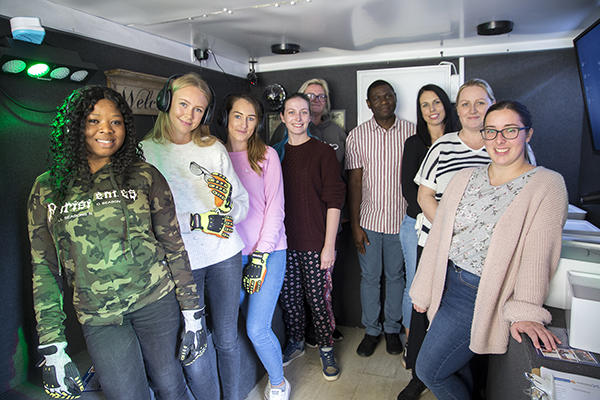Students Gain Greater Appreciation of the Challenges of living with Autism
Tuesday, 17 December 2019
Nursing students at the University of Worcester were given an insight into the world for those with conditions on the autism spectrum during a special training session.

The students took part in the Autism Reality Experience brought onto campus by Training 2 Care. Their specialised bus and individualised teaching is designed to give people an insight into the challenges and opportunities that people with autism encounter every day.
In pairs the students were asked to complete a series of tasks, in a limited time, wearing special gloves and glasses that altered perception of sense and sight. Meanwhile, the bus was darkened with flashing, coloured lights and distracted by loud noises and smells. This set of experiences aimed to emulate the sensory overload that someone with autism may experience.
This was followed by a teaching session, in which students were able to explore the day to day challenges of living with autism. The session aimed to challenge misconceptions and give students the chance to consider the best way to respond in order to enable an individual’s health and wellbeing.
Second year Adult Nursing student, Emaly Stedman, 26, of Newport, said: “I found it very interesting. I couldn’t have stayed in there much longer as the sensory overload made it difficult to concentrate. I think most healthcare professionals need to go through that. I think it was very useful for understanding the patient experience.”
Kehinde Fakeye, 40, a first year Mental Health Nursing student, said: “It was really surprising to experience how difficult it was to experience sensory overload and it helped me to understand how we can communicate better with people with learning difficulties.”
Kirsty Wedgbury, Senior Lecturer in Adult Nursing, and Sue Poultney, Senior Lecturer in Children’s Nursing, who led the project, said they aimed to give students of all fields of nursing an insight and experience into the care of children and adults with learning disabilities.
Ms Poultney added: “This novel teaching approach allowed students to appreciate the challenges that their patients with autism may experience every day. This helps students to understand why individuals may express themselves with behaviours that may be, at first, deemed challenging but can now be understood as a way of coping with the world around them. This newfound insight and knowledge will have a direct impact on the patient care that the students provide and will help to ensure that they achieve the highest standards for all children and adults with conditions on the autism spectrum and their families.”